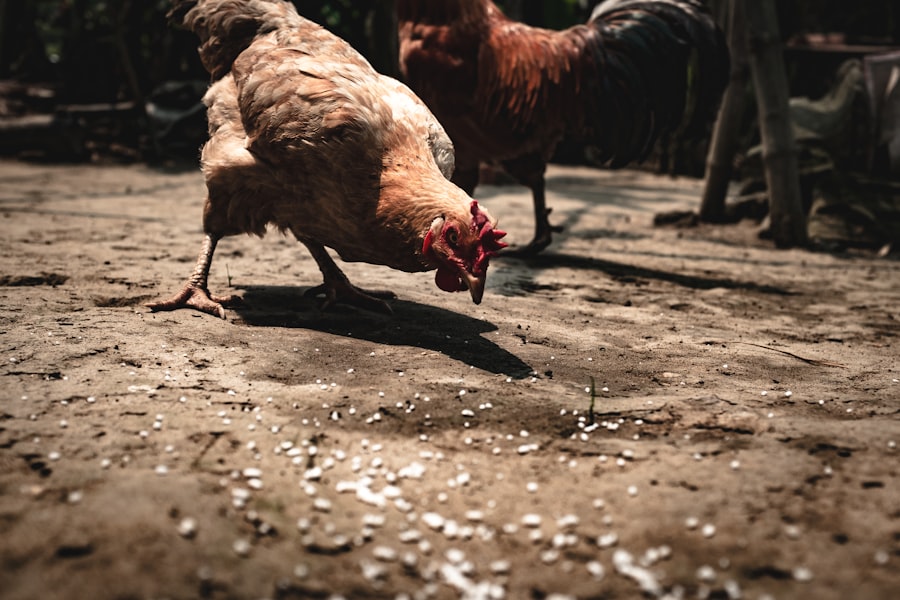Medicated feed is a specialized animal feed containing medications or additives designed to prevent or treat diseases in livestock, including chickens. These medications are typically incorporated into the feed as premixes, which are then combined with other feed ingredients. Common additives in chicken feed include antibiotics for preventing and treating bacterial infections, coccidiostats for preventing coccidiosis (a prevalent intestinal disease in chickens), and growth promoters to enhance chicken growth and overall health.
While medicated feed plays a crucial role in poultry farming by maintaining chicken health and preventing diseases, its use must be carefully managed. Responsible usage, in accordance with guidelines set by regulatory authorities and veterinarians, is essential. Improper use or overuse of medicated feed can lead to antibiotic resistance in chickens and potentially impact human health if antibiotic residues remain present in chicken products intended for human consumption.
Table of Contents
Key Takeaways
- Medicated feed is feed that contains medication to prevent or treat diseases in chickens.
- Medicated feed should only be used when there is a specific need, such as preventing a disease outbreak or treating a diagnosed illness.
- The age and duration for using medicated feed depends on the specific medication and the health needs of the chickens.
- Transitioning off medicated feed should be done gradually to prevent any health issues in the chickens.
- It is important to monitor the chickens’ health and adjust the feed as needed, and consult with a veterinarian for guidance on chicken health and medicated feed.
Determining the Need for Medicated Feed
Factors to Consider
Factors to consider when determining the need for medicated feed include the age of the chickens, their living conditions, and any previous history of disease outbreaks. For example, young chicks are more susceptible to diseases such as coccidiosis, so medicated feed containing coccidiostats may be necessary for them.
Risks Associated with Living Conditions
Additionally, if the chickens are raised in crowded or unsanitary conditions, they may be at a higher risk of bacterial infections, which would warrant the use of antibiotics in their feed.
Working with a Veterinarian
It is important to work closely with a veterinarian to assess the need for medicated feed and to develop a feeding program that meets the specific health needs of the flock. Veterinarians can conduct diagnostic tests and provide expert advice on the appropriate use of medicated feed based on the specific health challenges faced by the chickens.
Age and Duration Guidelines for Medicated Feed

The use of medicated feed for chickens is typically based on their age and the duration of time they are at risk for specific diseases. For example, chicks are often started on medicated feed shortly after hatching to prevent coccidiosis, which is a common and potentially deadly disease in young chickens. The duration of time that medicated feed should be used can vary depending on the specific medication and the risk factors present in the environment.
In general, medicated feed is used for a limited period of time until the chickens are no longer at risk for the targeted diseases. It is important to follow the age and duration guidelines for medicated feed provided by regulatory authorities and veterinarians to ensure the health and safety of the chickens. Using medicated feed for too long can lead to antibiotic resistance and can have negative effects on the overall health of the flock.
Conversely, stopping medicated feed too soon can leave the chickens vulnerable to diseases that could have been prevented with continued use of medication.
Transitioning Off Medicated Feed
Transitioning off medicated feed should be done gradually and under the guidance of a veterinarian to ensure the health and well-being of the chickens. Abruptly stopping medicated feed can leave the chickens vulnerable to diseases, especially if they are still at risk due to their age or living conditions. A gradual transition allows the chickens’ immune systems to strengthen and adapt to their environment without relying on medication.
When transitioning off medicated feed, it is important to closely monitor the health of the flock for any signs of disease or stress. If any issues arise, it may be necessary to continue using medicated feed or to implement other preventive measures such as improved sanitation or vaccination. The transition off medicated feed should be carefully planned and executed to minimize any negative impact on the health and productivity of the chickens.
Monitoring and Adjusting Feed
Monitoring the health and performance of the chickens is essential when using medicated feed. Regular observations of the flock can help identify any potential issues early on, allowing for prompt intervention if necessary. Additionally, regular weighing and growth monitoring can help assess the effectiveness of the medicated feed in promoting healthy growth and development in the chickens.
It is also important to adjust the feed ration as needed based on changes in the health status or growth rate of the chickens. For example, if there are signs of disease or poor growth, it may be necessary to increase the dosage of medication in the feed or to switch to a different type of medication. Conversely, if the chickens are healthy and growing well, it may be possible to reduce or eliminate the use of medicated feed altogether.
Consulting with a Veterinarian

Expert Advice on Medicated Feed
Veterinarians can provide expert advice on the appropriate use of medicated feed based on diagnostic tests and assessments of the health status of the chickens. They can also offer guidance on transitioning off medicated feed and implementing other preventive measures such as vaccination or improved sanitation.
Comprehensive Guidance on Chicken Health
In addition to providing guidance on medicated feed, veterinarians can also offer advice on other aspects of chicken health such as nutrition, housing, and disease prevention.
Optimizing Flock Health and Productivity
Working closely with a veterinarian can help ensure that the overall health and well-being of the flock are optimized, leading to better productivity and profitability for poultry farmers.
Best Practices for Chicken Health
In conclusion, using medicated feed for chickens is an important tool for preventing and treating diseases in poultry farming. However, it is crucial to use medicated feed responsibly and according to the guidelines provided by regulatory authorities and veterinarians. The decision to use medicated feed should be based on a thorough assessment of the health status of the flock and the risk of disease, with close attention paid to age and duration guidelines.
Transitioning off medicated feed should be done gradually and under the guidance of a veterinarian to ensure the health and well-being of the chickens. Monitoring and adjusting feed based on changes in the health status or growth rate of the chickens is essential for optimizing their health and productivity. Consulting with a veterinarian is crucial for developing a comprehensive feeding program that meets the specific health needs of the flock.
By following these best practices for chicken health, poultry farmers can ensure that their flocks remain healthy and productive, leading to better outcomes for both animal welfare and business success.
If you’re considering raising chickens, you may also be interested in learning about how to care for goslings. This article provides valuable information on the proper care and feeding of goslings, including tips on housing, feeding, and general health maintenance. It’s a great resource for anyone looking to expand their poultry knowledge beyond just chickens.
FAQs
What is medicated feed for chickens?
Medicated feed for chickens is a type of feed that contains medication, such as antibiotics or coccidiostats, to prevent or treat certain diseases or health issues in chickens.
How long should chickens be kept on medicated feed?
Chickens should be kept on medicated feed for the duration recommended by the veterinarian or the feed manufacturer. This typically ranges from 1 to 4 weeks, depending on the specific medication and the health issue being addressed.
Can chickens be kept on medicated feed indefinitely?
No, chickens should not be kept on medicated feed indefinitely. It is important to follow the recommended duration of medicated feed usage and then transition the chickens to a regular, non-medicated feed.
What are the potential risks of keeping chickens on medicated feed for too long?
Keeping chickens on medicated feed for too long can lead to antibiotic resistance and other health issues. It is important to use medicated feed only as directed and under the guidance of a veterinarian.
Are there alternatives to medicated feed for chickens?
Yes, there are alternatives to medicated feed for chickens, such as natural supplements, probiotics, and good management practices to prevent diseases. It is important to consult with a veterinarian to determine the best approach for maintaining chicken health.
Meet Walter, the feathered-friend fanatic of Florida! Nestled in the sunshine state, Walter struts through life with his feathered companions, clucking his way to happiness. With a coop that’s fancier than a five-star hotel, he’s the Don Juan of the chicken world. When he’s not teaching his hens to do the cha-cha, you’ll find him in a heated debate with his prized rooster, Sir Clucks-a-Lot. Walter’s poultry passion is no yolk; he’s the sunny-side-up guy you never knew you needed in your flock of friends!







